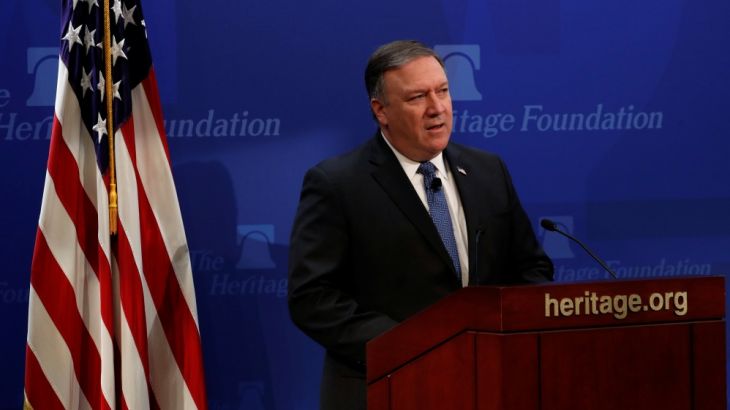Mike Pompeo lays out steep terms for Iran nuclear treaty
Mike Pompeo outlines 12 demands to be included in new treaty with Tehran, including removing all its forces from Syria.

The US secretary of state has outlined a series of steep demands to be included in a new nuclear treaty with Iran, including withdrawing all its forces from Syria, and threatened “the strongest sanctions in history” if Tehran does not comply.
Mike Pompeo’s comments came more than a week after the US withdrew from a multinational pact with Iran, in a move with major implications for the global oil trade and multibillion-dollar business deals.
Speaking at Heritage Foundation in Washington, DC, Pompeo said the US “will apply unprecedented financial pressure on the Iranian regime”.
|
|
He added: “The sting of sanctions will be painful if the regime does not change its course from the unacceptable and unproductive path it has chosen to one that rejoins the league of nations.”
Pompeo presented a list of 12 “basic requirements” for a new treaty, including that Iran must stop enrichment of uranium and never pre-process plutonium, as well as allow “unqualified access to all [nuclear] sites throughout the country”.
Pompeo also said Iran would have to end its interventions in regional affairs and conflicts, including in Lebanon and Yemen.
“We will track down Iranian operatives and their Hezbollah proxies operating around the world and crush them,” Pompeo said.
‘Shrug off an angry rhetoric’
His threat of further sanctions came as European parties to the landmark 2015 nuclear deal were working to find a way to keep the pact in effect with Iran, even without US participation.
There was no immediate comment from Iran to Pompeo’s speech, but after Washington’s exit, Tehran had said that “the interests of the people of Iran must be assured” for it to stay in the deal.
Al Jazeera’s Zein Basravi, reporting from Tehran, said that despite Pompeo’s strong rhetoric, the Iranian leadership is “likely to feel like this is nothing they haven’t heard from the United States before”.
“There is such an enormous trust deficit between the US and Iran that Iranian leaders are likely to really shrug this off as yet more angry rhetoric coming from the Trump White House,” he said.
Basravi added that Iran, a country that is party to the nuclear non-proliferation treaty, has repeatedly said “the allegations that it is pursuing nuclear weapons is not true”.
Under the deal signed in Vienna with six world powers – China, France, Russia, the UK, the US and Germany, as well as the European Union – Iran scaled back its enrichment of uranium and vowed not to pursue nuclear weapons in exchange for sanctions relief.
United Nations inspectors have repeatedly confirmed Iran’s compliance with the deal.
Still, US President Donald Trump on May 9 announced Washington’s withdrawal from the deal and said that he would impose tough economic sanctions on Iran
Several major European companies expressed concern about continuing business with Iran following the US exit, raising further doubts about the viability of the deal.
In his address, his first major policy speech since starting as top US diplomat late last month, Pompeo also warned European businesses who work with Iran in violation of US sanctions that they will be held “to account.”
Al Jazeera’s Natacha Butler, reporting from France’s capital, Paris, said that Pompeo’s comments about a new treaty are not likely to be received well in Europe.
“You can only imagine how European leaders might react to that,” she said.
“In many ways, it looks as if the US is dictating what should be done when, of course, from the Europeans’ point of view there is a deal already there that most European leaders say has been working and they say that Iran has been complying.